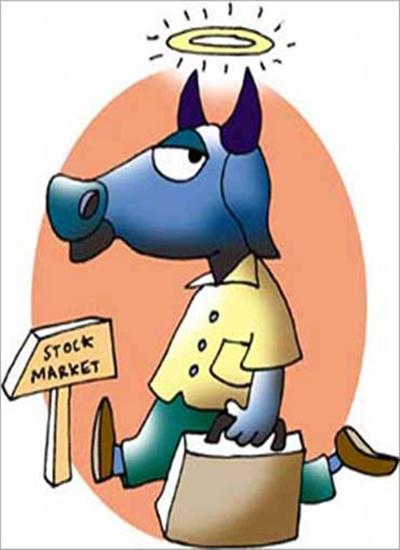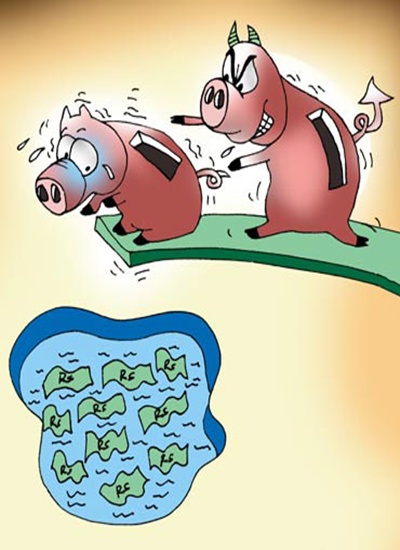
A few shares foreigners love have lifted markets, leaving investors open to a reversal of hot money as well as political risk, says Andy Mukherjee.
India's stock market has turned schizophrenic. A small group of shares that foreigners like to own is powering ahead.
The rest of the market is stuck in the doldrums, like the broader economy. Both global monetary conditions and local politics will play a role in ending this divergence. The fate of quantitative easing in the United States will matter, as will the outcome of the next general election in India.
For now, India looks like two markets rather than one. Even the 30-share Sensex is split down the middle. According to economist Ashutosh Datar at the Mumbai-based brokerage IIFL, the "favourite 15" shares with heavier foreign ownership, such as HDFC Bank, Infosys and Tata Motors, have outperformed, helping the benchmark surpass its January 2008 high in late October.
...

But the remaining 15 on which global investors don't shower as much love - including State Bank of India, Coal India and Reliance Industries - have lagged behind.
The chasm gets wider the further one moves towards mid-cap and small-cap stocks, IIFL's research shows. These shares, which have heavy local retail ownership, have been lagging 35 to 55 per cent behind the Sensex since 2008.
And that explains why small investors in India aren't "feeling" the rally they read about in the press. Domestic equity mutual funds saw their biggest outflows in 13 months in October, despite the Sensex rising nine per cent.
Will the tide of foreign money eventually lift all boats, or will it recede? The answer partly depends on the fate of the United States Federal Reserve's $85-billion-a-month quantitative easing programme under incoming Chair Janet Yellen.
...

After retreating from almost three per cent when the so-called "tapering" of bond-buying didn't commence in September, the yield on 10-year US government bonds is once again on the rise.
Meanwhile, US inflation is stuck at about 0.9 per cent. The inflation-adjusted cost of US debt is increasing, raising the hurdle rate for owning risky securities worldwide, including Indian equities.
Even if the departure of hot money from the Indian market is not as dramatic as it was during the summer months, new inflows could slow. There is, after all, little sign of a recovery in domestic demand.
Manufacturing is in a slump; the central bank's hands are tied because consumer price inflation is in double digits; the government, too, is unable to stimulate the economy because it must lower its budget deficit just when tax collections are faltering.
Foreigners have their reasons to return to this dismal landscape after pulling the local currency equivalent of $3.6 billion out of Indian equities between June and August. First, thanks to the currency depreciation that took place because of the sell-off, the market is not as pricey as some others in Asia.
...

The Sensex is trading at 16.4 times trailing annual earnings, compared with a price-to-earnings ratio of 18.4 for the Philippines.
The second reason overseas fund managers are returning to India is that the stocks they want to own don't have much to do with the domestic economy - though they do benefit from a weaker rupee.
The fortunes of outsourcing companies like Infosys and Tata Consultancy are tied to the US recovery. Similarly, generic drug makers such as Dr Reddy's and Sun Pharma are riding rich nations' efforts to keep a lid on rising health care costs.
Even lenders HDFC Bank and ICICI Bank are doing a better job of managing the local economic slowdown than government-owned rivals like State Bank of India.
Most importantly, foreigners don't want to miss out on the possibility that the election will bring in a more business-friendly government.
Goldman Sachs upset the ruling Congress party earlier this month with a report that said equity investors view Narendra Modi, the opposition Bharatiya Janata Party's (BJP's) prime ministerial candidate, as "an agent of change".
...

The optimism about Mr Modi forming a stable government in New Delhi may be premature, if not misplaced. Whether the BJP will win enough parliamentary seats on its own, whether it will find sufficient coalition members to support Mr Modi as prime minister, and whether he will live up to expectations, aren't settled questions yet.
Still, the unpredictability of Indian elections can make for a nice payday: the Sensex jumped 90 per cent in just three months in 2009. But the gamble is not for the faint of heart.
An unpleasant election outcome can inflict large losses - such as the 11 per cent single-day decline in the index in May 2004.
A surer bet for investors, though, is that monetary mismanagement, which was as much to blame as lax fiscal discipline for the debilitating currency crisis that the country faced in August, may have ended.
...

Unless the new Reserve Bank of India Governor Raghuram Rajan abruptly dumps his strategy of raising interest rates to tame inflation expectations of 13.5 per cent, the gloom will eventually lift.
But it will take time. The credit system is broken because banks are clogged with bad loans. The net non-performing assets of India's 40 publicly traded banks surged to $20 billion at the end of September, a 38 per cent jump from March, according to NPAsource.com.
The debris of past excesses must be flushed out before a new round of lending begins.
In the final analysis, it's the appetite of global investors for emerging market risk that will drive Indian stocks until the elections, which could be held in April or May next year.
India is almost assured of hot money inflows as long as the US bond market continues to interpret Ms Yellen's remark that the Fed has "more work to do" to mean more money-printing. But those interpretations can change. And if that happens before the Indian economy shows some proof of life, the schizophrenia in the market could worsen.
The writer is the Asia economics columnist at Reuters Breakingviews in Singapore.